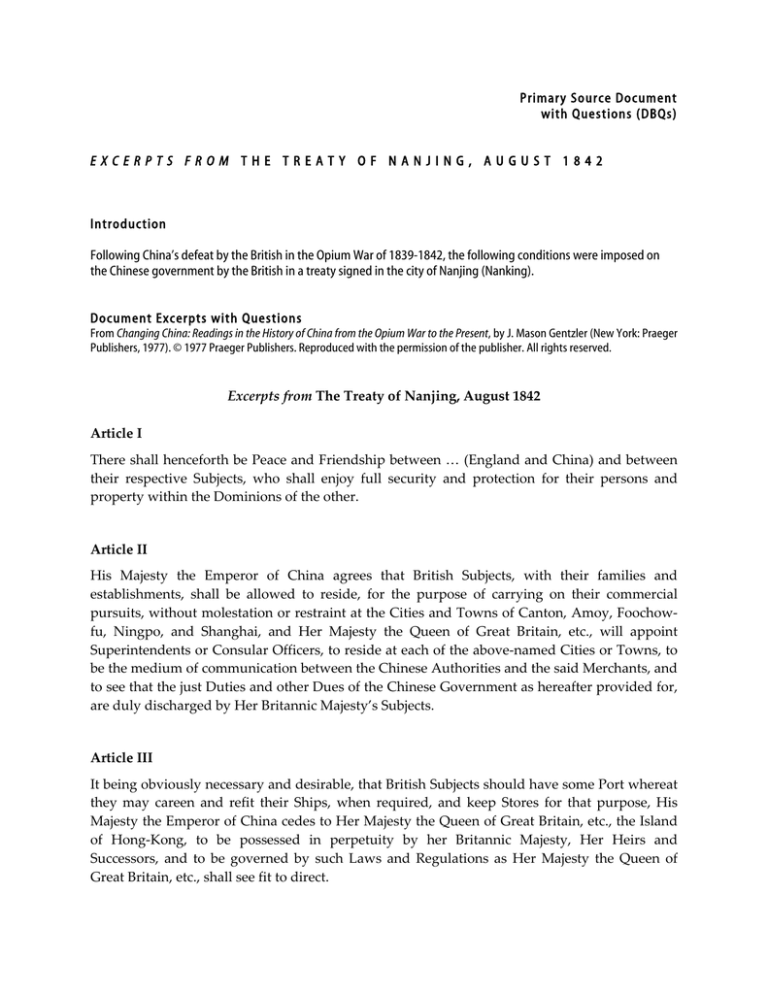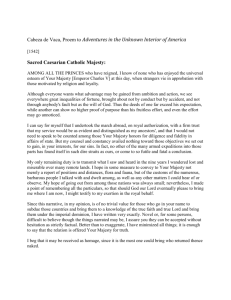
Primary Source Document
with Questions (DBQs)
EXCERPTS FROM THE TREATY OF NANJING, AUGUST 1842
Introduction
Following China’s defeat by the British in the Opium War of 1839-1842, the following conditions were imposed on
the Chinese government by the British in a treaty signed in the city of Nanjing (Nanking).
Document Excerpts with Questions
From Changing China: Readings in the History of China from the Opium War to the Present, by J. Mason Gentzler (New York: Praeger
Publishers, 1977). © 1977 Praeger Publishers. Reproduced with the permission of the publisher. All rights reserved.
Excerpts
from
The
Treaty
of
Nanjing,
August
1842
Article
I
There
shall
henceforth
be
Peace
and
Friendship
between
…
(England
and
China)
and
between
their
respective
Subjects,
who
shall
enjoy
full
security
and
protection
for
their
persons
and
property
within
the
Dominions
of
the
other.
Article
II
His
Majesty
the
Emperor
of
China
agrees
that
British
Subjects,
with
their
families
and
establishments,
shall
be
allowed
to
reside,
for
the
purpose
of
carrying
on
their
commercial
pursuits,
without
molestation
or
restraint
at
the
Cities
and
Towns
of
Canton,
Amoy,
Foochow‑
fu,
Ningpo,
and
Shanghai,
and
Her
Majesty
the
Queen
of
Great
Britain,
etc.,
will
appoint
Superintendents
or
Consular
Officers,
to
reside
at
each
of
the
above‑named
Cities
or
Towns,
to
be
the
medium
of
communication
between
the
Chinese
Authorities
and
the
said
Merchants,
and
to
see
that
the
just
Duties
and
other
Dues
of
the
Chinese
Government
as
hereafter
provided
for,
are
duly
discharged
by
Her
Britannic
Majesty’s
Subjects.
Article
III
It
being
obviously
necessary
and
desirable,
that
British
Subjects
should
have
some
Port
whereat
they
may
careen
and
refit
their
Ships,
when
required,
and
keep
Stores
for
that
purpose,
His
Majesty
the
Emperor
of
China
cedes
to
Her
Majesty
the
Queen
of
Great
Britain,
etc.,
the
Island
of
Hong‑Kong,
to
be
possessed
in
perpetuity
by
her
Britannic
Majesty,
Her
Heirs
and
Successors,
and
to
be
governed
by
such
Laws
and
Regulations
as
Her
Majesty
the
Queen
of
Great
Britain,
etc.,
shall
see
fit
to
direct.
Primary Source Document with Questions (D BQs) on
EXCERPTS FROM THE TREATY OF NANJING, AUGUST 1842
Article
V
The
Government
of
China
having
compelled
the
British
Merchants
trading
at
Canton1
to
deal
exclusively
with
certain
Chinese
Merchants
called
Hong
merchants
(or
Cohong)
who
had
been
licensed
by
the
Chinese
Government
for
that
purpose,
the
Emperor
of
China
agrees
to
abolish
that
practice
in
future
at
all
Ports
where
British
Merchants
may
reside,
and
to
permit
them
to
carry
on
their
mercantile
transactions
with
whatever
persons
they
please,
and
His
Imperial
Majesty
further
agrees
to
pay
to
the
British
Government
the
sum
of
Three
Millions
of
Dollars,
on
account
of
Debts
due
to
British
Subjects
by
some
of
the
said
Hong
Merchants
(or
Cohong)
who
have
become
insolvent,
and
who
owe
very
large
sums
of
money
to
Subjects
of
Her
Britannic
Majesty.
Article
VII
It
is
agreed
that
the
Total
amount
of
Twenty‑one
Millions
of
Dollars,
described
in
the
three
preceding
Articles,
shall
be
paid
as
follows:
Six
Millions
immediately.
Six
Millions
in
1843
…
Five
Millions
in
1844
…
Four
Millions
in
1845
…
Article
IX
The
Emperor
of
China
agrees
to
publish
and
promulgate,
under
his
Imperial
Sign
Manual
and
Seal,
a
full
and
entire
amnesty
and
act
of
indemnity,
to
all
Subjects
of
China
on
account
of
their
having
resided
under,
or
having
had
dealings
and
intercourse
with,
or
having
entered
the
Service
of
Her
Britannic
Majesty,
or
of
Her
Majesty’s
Officers,
and
His
Imperial
Majesty
further
engages
to
release
all
Chinese
Subjects
who
may
be
at
this
moment
in
confinement
for
similar
reasons.
Article
X
His
Majesty
the
Emperor
of
China
agrees
to
establish
all
the
Ports
which
are
by
the
2nd
Article
of
this
Treaty
to
be
thrown
open
for
the
resort
of
British
Merchants,
a
fair
and
regular
Tariff
of
Export
and
Import
Customs
and
other
Dues,
which
Tariff
shall
be
publicly
notified
and
promulgated
for
general
information,
and
the
Emperor
further
engages,
that
when
British
Merchandise
shall
have
once
paid
at
any
of
the
said
Ports
the
regulated
Customs
and
Dues
Guangzhou
1
Asia for Educators l Columbia University l http:afe.easia.columbia.edu
Page 2 of 3
Primary Source Document with Questions (D BQs) on
EXCERPTS FROM THE TREATY OF NANJING, AUGUST 1842
agreeable
to
the
Tariff,
to
be
hereafter
fixed,
such
Merchandise
may
be
conveyed
by
Chinese
Merchants,
to
any
Province
or
City
in
the
interior
of
the
Empire
of
China
on
paying
further
amount
as
Transit
Duties
which
shall
not
exceed
___
percent2
on
the
tariff
value
of
such
goods.
Questions:
1. How would the conditions laid forth in this treaty affect the fiscal health of
the Qing empire?
2. In China, (and in many Western texts), the Treaty of Nanjing is called the first
of the “unequal treaties.” Is the term “unequal treaty” justified by the
content and wording of the treaty? Please explain.
3. On the British side, whose interests are best served by this treaty? In other
words, who or what kind of people stand to gain?
4. Are there Chinese who might gain something from some of the terms of this
treaty? Explain.
Tariff
schedules
were
not
settled
at
this
time.
The
tariff
rates
on
various
goods
were
fixed
after
further
discussions;
they
averaged
about
five
percent.
2
Asia for Educators l Columbia University l http:afe.easia.columbia.edu
Page 3 of 3


